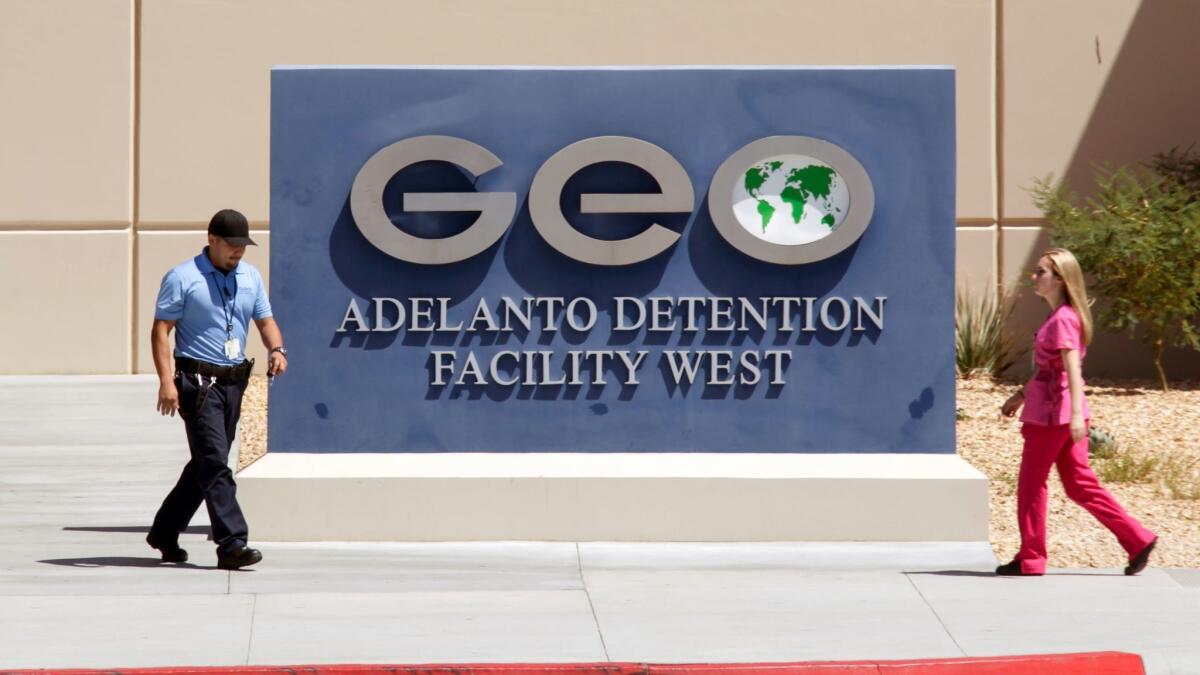Court blocks California from banning privately run U.S. immigration detention centers

- Share via
A federal appeals court decided Tuesday that California must exempt federal immigration detention centers from its ban on for-profit prisons.
In a 2-1 ruling, a panel of the U.S. 9th Circuit Court of Appeals said a California law aimed at phasing out privately run prisons may not include immigration detention centers in the state.
“California is not simply exercising its traditional police powers,” wrote 9th Circuit Judge Kenneth K. Lee, a Trump appointee, “but rather impeding federal immigration policy.”
The law, which took effect last year, had been largely upheld by a district court judge. The federal government and GEO Group, a Florida-based private prison corporation that runs two immigration centers, appealed, arguing that the state statute improperly interfered in federal government matters.
California countered that it had the legal right to safeguard the health and safety of detainees in the state, but the 9th Circuit said the law discriminated against the federal government. The court said the U.S. Immigration and Customs Enforcement (ICE) has only privately run detention centers in California, where immigrants are held until they are deported or released. Activists disputed that, noting the ban would still leave in place one holding facility.
California Atty. Gen. Rob Bonta, who wrote the law as an assemblyman, indicated in a statement that the state was likely to appeal.
“We will continue the fight to ensure the dignities and rights of everyone in California are protected,” he said. “As a Filipino American who was brought to this country as an infant, this fight is personal to me. While the road ahead may feel a little longer today, our work continues, and we will keep pushing forward.”
The Legislature passed the measure and Gov. Gavin Newsom signed it into law in 2019 based on reports of substandard conditions, inadequate medical care, sexual assaults and deaths in for-profit prisons. Other states have passed similar measures, including Illinois, Nevada, New York and Washington.
California’s law prevents the state from entering into or renewing contracts with for-profit prison companies after Jan. 1, 2020, and phases out the facilities by 2028.
The law granted several exemptions for detention centers that contract with the state but provided none to those that contract with federal immigration authorities, the 9th Circuit said.
By phasing out the privately run immigration detention centers, the law “tries to regulate an area — detention of immigrants — that belongs exclusively in the realm of the federal government,” the panel majority said.
The law, AB 32, “bulldozes over the federal government’s ability to detain immigrants by trying to ban all the current immigration detention facilities in California,” Lee wrote, joined by Judge Bridget S. Bade, also a Trump appointee.
Judge Mary H. Murguia, an Obama appointee, dissented. She said that states’ historic police powers included regulations affecting health and safety.
“Nothing in AB 32 prevents the federal government from apprehending and detaining noncitizens who are present in the country unlawfully,” she wrote.
Last week, lawyers now representing the Biden administration urged a panel of judges on the 9th Circuit Court of Appeals to repeal the law.
Murguia noted that the state law allows the federal centers to continue operating until at least 2024 and that the federal government has recently indicated that it might not renew contracts for those facilities.
Jackie Gonzalez, policy director for Immigrant Defense Advocates, which pushed for the passage of AB 32, called the court’s ruling an overreach based on a flawed interpretation of the immigrant detention system. She said the decision was not the final word on the constitutionality of the law.
“AB 32 was very clearly a bill aimed at protecting the health, safety and welfare of individuals subjected to the abuses of private prison corporations,” she said. “Since its enactment, California has closed every private prison and immigration authorities, and the federal government have gone to pains to circumvent the law and expand detention.”
Weeks before AB 32 took effect, federal officials signed contracts totaling nearly $6.5 billion with GEO and two other companies, CoreCivic and Management and Training Corp., ending in 2034.
The private prison ban would force the closure of seven privately run immigration detention facilities, which collectively have space for nearly 7,200 people. ICE argued that the closures would force detainees to be transferred out of state, away from family and lawyers, while supporters of the law said ICE could instead use alternatives to detention, such as ankle monitors.
Activists noted the ban would still leave ICE with one facility in California: the Yuba County Jail, which has space for 220 detainees.
In 2019, the average cost for each inmate in a California state prison was nearly $85,000 compared with $31,00 for an inmate in a privately run prison. Bonta argued that the private operators cut corners to save money to the detriment of the prisoners.
The law initially covered only state facilities, but Bonta later amended the bill to expand the ban to immigration detention centers. The amendment followed a federal government review that found 14,000 health and safety deficiencies, including failures to notify the government about sexual assaults, at such centers between October 2015 and June 2018.
Nationally, the immigration enforcement agency has about 51,000 people in custody. California houses less than 8% of them.
ICE declined to comment. The GEO Group did not immediately respond to a request for comment.
More to Read
Sign up for Essential California
The most important California stories and recommendations in your inbox every morning.
You may occasionally receive promotional content from the Los Angeles Times.













